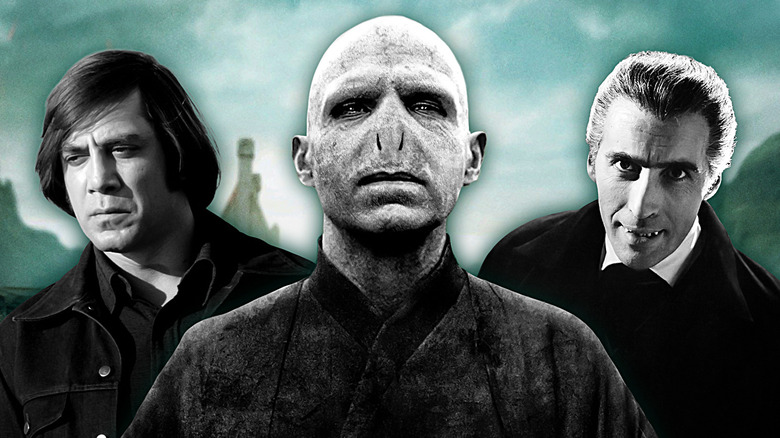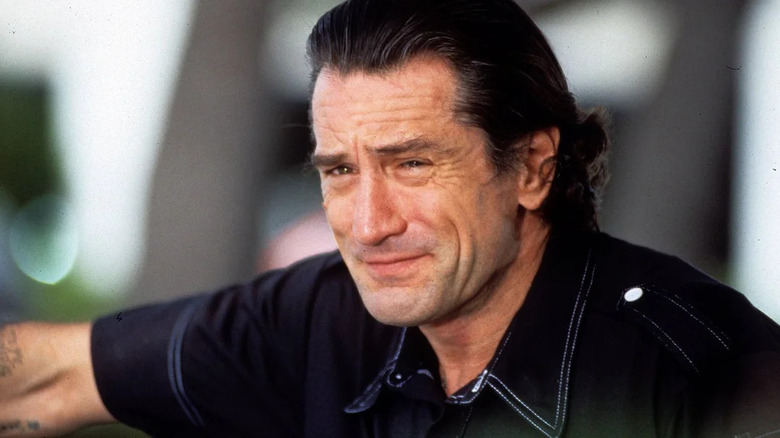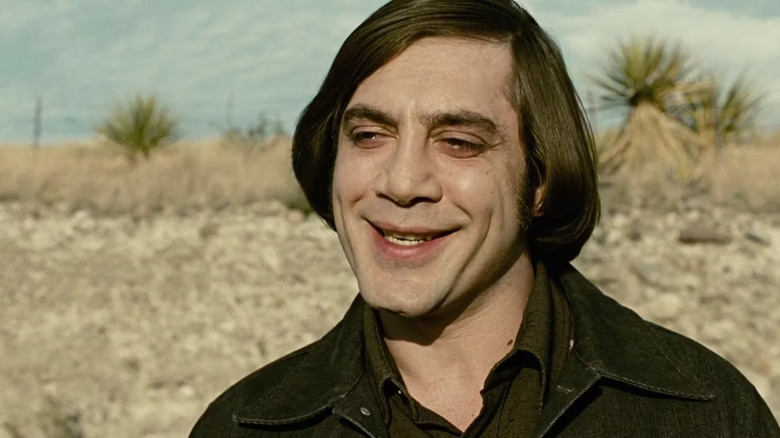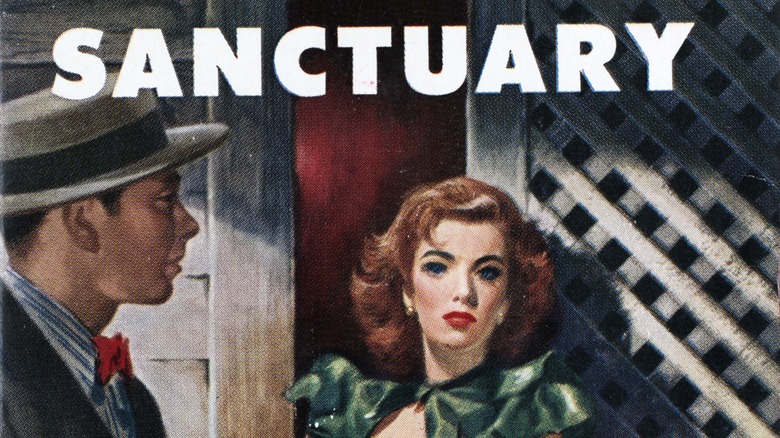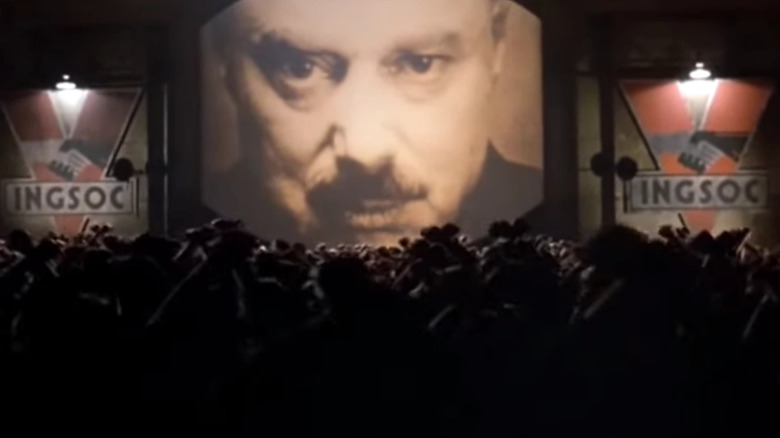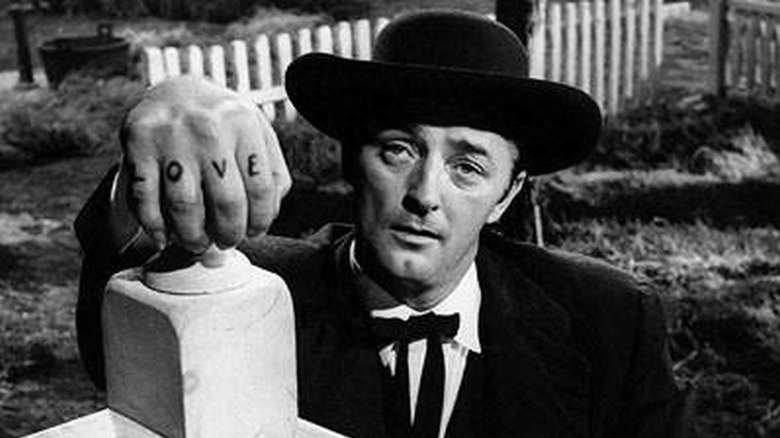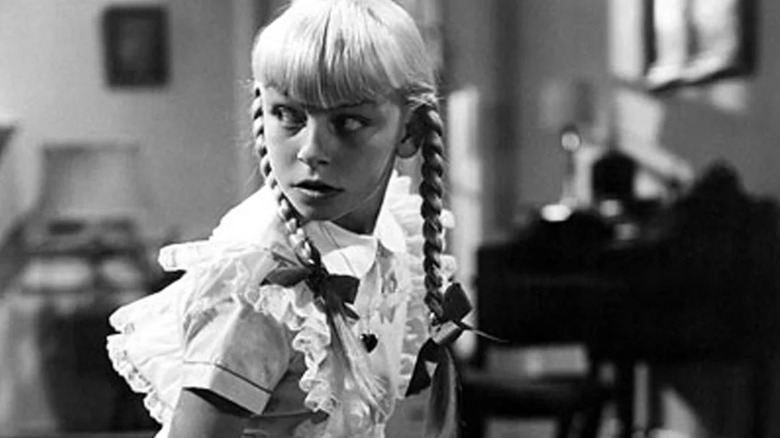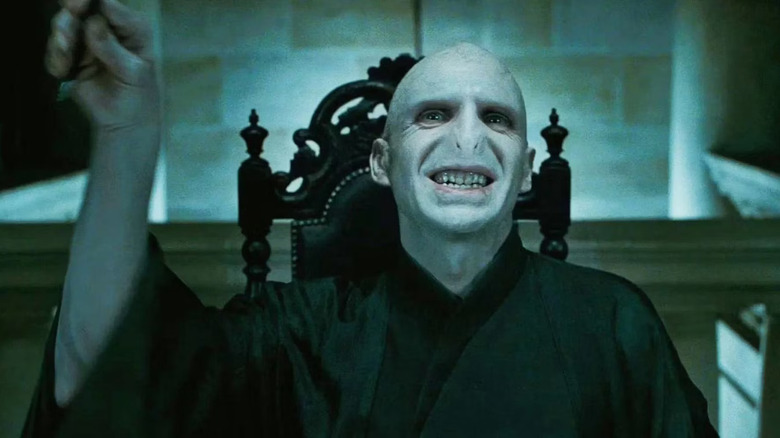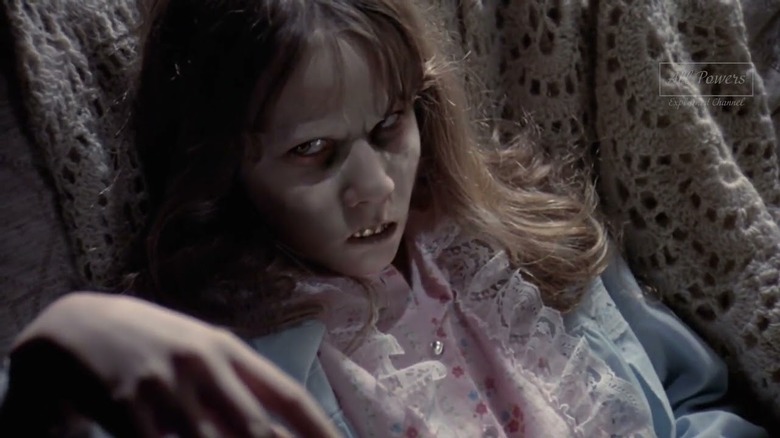Stephen King's 10 Favorite Villains Of All Time
This article contains discussions of sexual assault.
If there's one thing Stephen King knows pretty well, it's villains. The prolific horror author has been writing basically nonstop since he released "Carrie," his debut novel, back in 1974, and his work has been endlessly adapted for both the big and small screen. (If you're not a big reader but you know "The Shining," "The Shawshank Redemption," or "Pet Sematary," then you know King's work.) In 2009, he even compiled a list of his favorite villains that he didn't create, and it's a pretty solid rundown — which certainly isn't surprising.
From literary icons to on-screen favorites to a villain with a confusingly familiar name — I'll clarify that whole thing when we arrive at that point — here are Stephen King's top ten villains of all time, whom he ranked for Entertainment Weekly at the close of the aughts. (A disclaimer: that's probably why it's missing some incredible villains from the years that followed, like Rose Armitage from "Get Out," Immortan Joe from "Mad Max: Fury Road," Amy Elliott Dunne from "Gone Girl," or even Thanos from the Marvel Cinematic Universe, just to name a few standouts.) King ranked his top 10 from "least villainous" to "most villainous," apparently, so we've preserved that order here.
Max Cady from Cape Fear
As Stephen King points out on his list, you probably know Max Cady best from "Cape Fear," Martin Scorsese's 1991 thriller based on John D. MacDonald's 1957 novel "The Executioners." (Scorsese's version is actually the second movie adaptation; the first came out in 1962.) While Robert Mitchum played the first iteration of Max Cady (and it's important to note that we'll circle back to Mitchum on this list), Robert De Niro arguably made the character far more famous alongside his frequent collaborator Scorsese, with his vicious, fiendish Max Cady hunting a young girl named Danielle "Danny" Bowden (Juliette Lewis).
After Max is released from prison for sexually assaulting and murdering a different young girl, he makes a beeline for Danny's father Sam Bowden (Nick Nolte), who was his attorney before his imprisonment — and hid crucial information that could have led to a lesser sentence. De Niro is terrifying as Max, who stalks and even seduces Danny before a showdown with Sam and his wife Leigh (Jessica Lange) that leads to a bloody conclusion. King, according to his list, loves both De Niro and Mitchum's performance, but he's still loyal to MacDonald's source material; as he said, Max is "never more scary than in MacDonald's tightly wrapped novel."
Anton Chigurh from No Country for Old Men
Sometimes, the scariest villain is one who seems meek and quiet — which is precisely why Anton Chigurh, the antagonist in both versions of "No Country for Old Men," is so frightening. In Cormac McCarthy's acclaimed novel, Anton is frightening enough, but he's brought to life in the most upsetting manner possible in Joel and Ethan Coen's 2007 film adaptation, where he's played by a sneering, whispering Javier Bardem sporting the most sinister bob you've ever seen. (Bardem won an Academy Award for the role, which shouldn't surprise you in the least if you've seen the movie.) As Anton hunts Llewelyn Moss (Josh Brolin), a man who stumbled across a large sum of money that Anton has been ordered to recover, Llewelyn keeps outsmarting the hitman ... yet seems unable to ever fully shake Anton off his tail. Nevertheless, it's Anton's showdown with Sheriff Ed Tom Bell (Tommy Lee Jones) that provides one of the movie's scariest moments.
King, for his part, called Anton Chigurh "Cormac McCarthy's scariest creation," honing in on the villain's choice of weapon. "Mostly, I think, because of Chigurh's weapon of choice, an air-driven cattle gun that shoots a retracting pneumatic bolt," he clarified. This is seen in both the book and film, and King's right; it's a particularly unsettling weapon.
Popeye (not that one) from Sanctuary
If you're familiar with the acclaimed American author William Faulkner, you might know some of his prominent novels like "The Sound and the Fury," "As I Lay Dying," or even his Pulitzer Prize winner "The Fable." If you aren't familiar with his 1931 novel "Sanctuary," though, definitely tread carefully. This one isn't for the faint of heart — and Stephen King knows it, which is why he picked the book's villain Popeye for his list.
"Sanctuary" centers entirely around the violent, brutal sexual assault of a young woman named Temple Drake in the fictional Yoknapatawpha County, Mississippi (a county that Faulkner created and uses extensively in his work), and the story is told through the perspective of lawyer Horace Benbow. After Horace hitchhikes into the American South, he meets a bootlegger named Lee Goodwin, one of his collaborators — a creep who goes by Popeye — and a bachelor named Gowan Stevens who has his eye on Horace's widowed sister Narcissa. A whole lot of really messed-up stuff happens in this book, but the bottom line is that Temple is abducted and assaulted in the most horrific way possible, specifically by Popeye. As King put it, "[Popeye] commits the most infamous [assault] in modern fiction. It's so gruesome that I can't describe it in a family magazine."
Big Brother from 1984
Speaking of literary icons, you've almost definitely heard of George Orwell — and if you have, you know about his book "1984." It's the story of a dystopian society run by the specter of Big Brother, who sees and knows everything, aided by the Thought Police, the Ministry of Truth, and the Party (of which Big Brother is the supreme leader). We never see Big Brother — in one of the novel's most well-known adaptations, a version literally released in 1984 by director Michael Radford and starring John Hurt as protagonist Winston Smith, the leader is only seen in a still image, where he's played by Bob Flag. Still, he's terrifying, and the consequence Winston eventually faces for going against Big Brother's rule is absolutely gut-wrenching.
"He's watching you from every telescreen in George Orwell's more-relevant-than-ever novel of a nightmare dictatorship where war is peace, freedom is slavery, ignorance is strength, and one man struggles for a better, saner life," King wrote on his list, summing it up pretty perfectly. Of course, the author had to add in a little jab at the end; in parentheticals, he wrote of the quest for a better, saner life, "Good luck on that."
Harry Powell from The Night of the Hunter
Based on the 1953 novel of the same name by David Grubb, the 1955 noir "The Night of the Hunter" — directed by Hollywood legend Charles Laughton — focuses on a "preacher" named Harry Powell, who made Stephen King's list of great pop culture villains thanks in large part to star Robert Mitchum's unsettling performance. ("In the film version, Robert Mitchum gave him the face that caused a thousand nightmares," King wrote.)
Here's the thing about Harry — he's not a preacher at all, but a sinister serial killer who ends up serving 30 days in jail for a minor offense unrelated to any of his more serious wrongdoing. (He also has "LOVE" tattooed on the knuckles of one hand and "HATE" on the other, which is ... a choice.) When he learns from his cellmate Ben Harper (Peter Graves) that the man hid $10,000 and only told his children the location of the cash, Harry finishes his sentence and goes after Ben's wife Willa (Shelley Winters) and his children John (Billy Chapin) and Pearl (Sally Jane Bruce). What Harry does from that point on to what remains of the Harper family — Ben is executed as a murderer — can't even really be described here, but just believe King. Harry Powell is scary.
Rhoda Penmark from The Bad Seed
Another literary adaptation (which isn't shocking considering that this is a list of villains compiled by one of the most well-known authors of all time), the 1965 film "The Bad Seed" is based on William March's 1954 novel of the same name and tells the unsettling, disturbing story of Rhoda Penmark (Patty McCormack), an eight-year-old girl who also happens to be a deadly murderer. After Rhoda's father Kenneth (William Hopper) leaves home to serve in the military, Rhoda's mother Christine (Nancy Kelly) starts noticing some odd things ... notably, that she thinks her daughter might be responsible for the death of a young boy. When Christine finds out that she's related to a serial killer, she starts worrying about Rhoda more and more, leading to a truly ugly confrontation between mother and daughter.
It's entirely unsurprising that King prefers March's book, but he does have a solid reason. "Patty McCormack gave her all as Rhoda in the film version of 'The Bad Seed,' but during the mid-'50s Hollywood was in Full Prude Mode, and the movie is oddly lifeless," King argued on his list. "For true malevolence, you have to go to William March's novel."
Voldemort from the Harry Potter franchise
"Good God, he tried to kill Harry Potter and all his friends!" Stephen King wrote in his list. "Do I have to say more?" No, Mr. King did not have to say more — but I will. Born Tom Marvolo Riddle to a magical mother and a Muggle father (the latter of whom didn't even know he existed), the wizard that would become the Dark Lord Voldemort did not have an easy upbringing, but that's no excuse, all things considered. Throughout the "Harry Potter" books and films, we watch as Voldemort — played onscreen by several actors but most prominently by Ralph Fiennes — reappears just about every school year to try and kill Harry (Daniel Radcliffe), the much-younger wizard who mysteriously bested Voldemort when he was only an infant. (I will say, though, that Voldemort typically waits until the end of said school year to enact his various murder plots, which is considerate.)
King is right, though; Voldemort is pretty awful! His army, the Death Eaters, commit the bulk of his atrocities, but Voldemort's pale white hands definitely aren't clean. Before the narrative even begins, he murders Harry's parents just to try and kill a baby, and he kills a whole lot of people in his quest to take over the Wizarding World. Also, he doesn't have a nose, which is unsettling and weird.
Sauron from The Lord of the Rings
If you know Voldemort, you definitely know Sauron from "Lord of the Rings" — a point that Stephen King makes by saying Sauron is "probably the prototype for Voldemort, but even scarier. And with bigger ambitions." King, once again, is absolutely right; Voldemort feels a lot more fallible than Sauron, and it's definitely a lot easier to take Voldemort down for good (multiple Horcruxes notwithstanding). Created by J.R.R. Tolkien, the villainous Sauron is, as King put it, "bloated with the power (and the evil) of the Great Ring, the villain of Tolkien's trilogy wants to destroy everything."
Sauron's whole deal is that he wants to overtake Middle-earth with his dark forces, a task that definitely feels doable once he secretly forges the One Ring in the fires of Mount Doom and uses its absolute power to suppress and squash any rebellion against him. When Gondor's king Isildur, played by Maxim Baldry in Prime Video's prequel series "The Rings of Power" opposite Charlie Vickers' Sauron, chops the villain's hand off — a scene depicted in Peter Jackson's trilogy with Harry Sinclair as Isildur — the Ring is lost for generations, but Sauron turns himself into an omniscient giant eye (gross) and assembles a whole bunch of disgusting minions like the Orcs. He's definitely formidable, even if he gets taken down by a hobbit in the end.
Pazuzu (and Regan) from The Exorcist
We barely see the demon Pazuzu on-screen in William Friedkin's iconic 1973 horror film "The Exorcist," but we do see what Pazuzu does to a little girl named Regan, and that's enough to put him second on Stephen King's list. Adapted from the 1971 novel by William Peter Blatty, who also penned the movie's screenplay, "The Exorcist" focuses on Regan (Linda Blair) and her demonic possession by Pazuzu (voiced by Ron Faber and Mercedes McCambridge, with Eileen Dietz serving as the demon's "face" when it's briefly shown). Pazuzu makes poor Regan do all sorts of horrible stuff, including but not limited to performing unspeakable acts with a crucifix, speaking in twisted tongues, vomiting in the face of priest Damien Karras (Jason Miller), and turning her head by 180 degrees.
King is nothing if not consistent; according to the author himself, he prefers Blatty's depiction of Pazuzu. "Linda Blair's portrayal of the haunted little girl was frightening, but the demon who lives in the pages is far scarier," the writer mused on his list. You can decide for yourself between both the book and the novel, but the point is that Pazuzu is downright creepy.
Count Dracula from Dracula
So, who was Stephen King's favorite villain back in 2009? He went with a classic pick — Dracula, the blood-sucking vampire created by Bram Stoker in the author's seminal 1897 novel. Arguably the template for basically every evil vampire that followed, Dracula has been played by some of the industry's greatest performers, including Béla Lugosi, Gary Oldman, and one particular performer that King really loved. But what did he have to say about his number-one villain?
"Stoker's courtly, sinister creation is still literature's greatest villain, and although he's been portrayed on the screen by a dozen actors — Christopher Lee is surely the best of them — none can equal the one in the book," King wrote, once again sticking to the merits of the source material before making an excellent point about Stoker's use of dramatic tension. "And Stoker's most amazing achievement? After the first 100 pages, the sanguinary count mostly lurks off stage," King stated. "It's a lesson for all of us: Villains are scarier in the shadows." King, again, is right ... and as the guy who created Annie Wilkes, Pennywise, and Randall Flagg, he certainly would know.
If you or anyone you know has been a victim of sexual assault, help is available. Visit the RAINN website or contact RAINN's National Helpline at 1-800-656-HOPE (4673).
